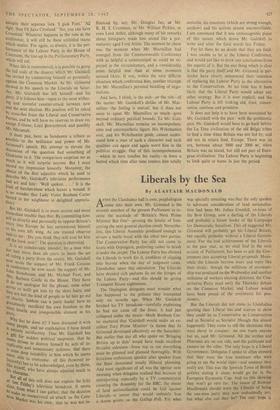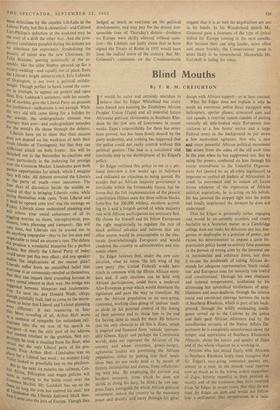Liberals by the Sea
By ALASTAIR MACDONALD
AFTER the Llandudno ball is over, psephologists come into their own. Mr. Grimond is the seventh member of the present Parliament to re- ceive the accolade of 'Britain's Next Prime Minister But One'--proving the fatuity of fore- casting the next general election result. Neverthe- less, this Liberal Assembly produced enough to ensure a battle royal with the other two parties. The Conservative Party has still not come to terms with Orpington, preferring rather to brush it under the carpet. The Labour Party has allowed the Liberals to work for it, confident of slipping into heaven when the day of judgment came. Llandudno upset this calculation. The Liberals have decided rich pastures lie on the fringes of the Labour Party—and this should be giving Transport House nightmares.
The Orpington delegates must wonder what has happened to the policies they trumpeted only six months ago. When Mr. Gaitskell finished his TV broadcast—carefully explaining he had not come off the fence, it had just collapsed under the strain—Mark Bonham Car- ter muttered that `Gaitskell would make an ex- cellent Tory Prime Minister' (a theme that Jo Grimond developed effectively on the Saturday). But earlier that day all who spoke on 'Bringing Britain up to date' would have made excellent Socialist salesmen—from top to toe everything must be planned and planned thoroughly. With ferocious enthusiasm speaker after speaker from the floor demanded totally illiberal planning. And most significant of all was the uproar next morning when delegates realised that because of misreporting, especially by a TV commentator covering the Assembly for the BBC, the smear of land nationalisation could be laid against Liberals—a smear that would certainly lose a dozen points on the Gallup Poll. Yet what was specially revealing was that the only speaker to advocate consideration of land nationalisa- tion had been Mr. Julian Grenfell, ex-beau of the Bow Group, now a darling of the Liberals and probably a future leader of the Campaign for Democratic Socialism. This all suggested Mr. Grimond will probably get his Liberal Britain, but equally probably without a Liberal Govern- ment. For the real achievement of the Liberals in the past year, as we shall find in the next session of Parliament, has been to jolt the Gov- ernment into accepting Liberal proposals. Mean- while the Liberals become more and more like their rivals: though the millstone of co-owner- ship was produced on the Wednesday and another millstone of workers electing directors, the Con- servative Party must envy the Thursday debate on the Common Market, and Labour would have been proud of the sentiments for pen- sioners.
But the Liberals did not come to Llandudno sporting their Liberal ties and scarves to show they could be as Conservative as Conservatives and as Socialist as Socialist (though this almost happened). They came to tell the electorate they were about to conquer: no one trusts anyone but us, said Mr. Grimond. All the scribes and Pharisees are on one side, and the publicans and sinners on the other. The only hope is a Liberal Government. Delegates I spoke to often stressed that they were the true amateurs who were going to set the world right—and amateur they really are. This was the Ipswich Town of British politics stating it alone would go far in the European Economic Cup. And on this showing they won't go very far. The lesson of Ramsay MacDonald should warn the Liberals of being the one-man party they now undoubtedly are, but what else can they be? The only hope is
THE SPECTATOR, SEPTEMBER 28 mass defections by the capable Lib-Labs in the Labour Party, but this is chimerical—and Colonel Lort-phillips's defection at the weekend may be the start of a drift the other way. And the pros- pective candidates paraded during the debates are no substitute for experience. Symbolising the Paucity of talent was the new Chairman, Sir Felix Brunner, peering quizzically at the as- sail/WY, like the elder Steptoe spruced up for a society wedding—and equally out of place. Even the Liberal's bright status-symbol, Eric Lubbock of Orpington, is not even a political middle- weight. Though perfect to hawk round the coun- try in triumph, to appear on posters and open fetes, Eric Lubbock's sentences, with his mouth- ful of marbles, give the Liberal Party no grounds for confidence—enthusiasm is not enough. While the very old still came along for a holiday by the seaside, the undergraduate element was stronger than ever—and undergraduate remedies for the world's ills shone through the debates. Liberals have yet to show that their success does not depend on the weakness of both their rivals (shades of Torrington), but that they can withstand attack on both fronts: this will be thrashed out in the November by-elections and more particularly in the jockeying for prestige over the Common Market. Llandudno gave both Parties opportunities for attack, which 1 imagine they will take. All debates revealed the Liberals as the party of youth—even innocence. The f°11r days of discussion beside the seaside re- vealed all that is bringing Liberals votes, while laying themselves wide open. 'Vote Liberal and it shall be opened unto you' was the message on Friday. Liberals alone understand planning and Will relieve your social conscience of all its niggling worries on slums, unemployment, pen- sioners, town planning and transport: this will , do time, but Liberals can be trusted not to uu anything unpopular—they're far too nice and respectable to tread on anyone's toes. The debate did Produce a wonderful blueprint for a perfect Britain. But clearly the Liberal Party of today could never put this into effect: did any speaker realise the implications of the master plan? Liberals suffer from an unjustified belief that everyone is as community-minded as themselves, that they can impart their crusading fervour to suggested vested interest in their way. No bridge was
ggested between blueprint and implementa-
ell' To save the day Donald Wade, chirpy though Painfully frail, had to come to the micro- phone to insist that Liberal and Labour planning were different : it was reassuring to hear this' Most revealing of all, Arthur Holt wrote in a sentence of sympathy for redundant rail- waymen into the set text of his speech on that sport—it was the only part of his address pt4ist. seemed revelant to the problem. Not sur- „_uthglY he took a mauling from the floor, who pro- posals' out the only Liberal parts of his pro- piae s' Poor Arthur Holt—Llandudno was no
e for a Liberal last week : no wonder Lady ,
looked so gracefully lost on the platform. But in Ira' the next six months the railways, Cen- seem Pilkington and wages policies will Com,_anothing to the battle royal over the fenert Market. Mr. Gaitskell 'has sat on the htat ',La?, long the iron has entered his soul,' but uticino the Liberals followed Mark Bon- `-arter into the joys of Europe. Though they
hedged as much as everyone on the political developments, and may pay for the almost irre- sponsible tone of Thursday's debate—doubters on Europe were shrilly silenced without ques- tion—the Liberals can justly claim that to have signed the Treaty of Rome in 1957 would have been the radical move of the century. But Mr. Grimond's comments on the Commonwealth suggest that it is as well the negotiations are not in his hands. In his Wonderland speech Mr. Grimond gave a foretaste of the type of lyrical ballad for Europe coming in the next months. But because they can sing louder, more often and more brashly, the Conservatives' paean is more likely to be remembered. Meanwhile Mr. Gaitskell is losing his voice.



































 Previous page
Previous page